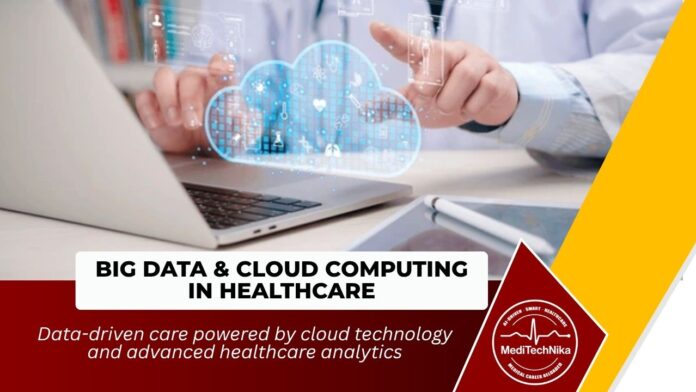BIG DATA & CLOUD COMPUTING IN HEALTHCARE
Cloud Computing in Healthcare: Healthcare is now advancing in a rapid way that it is entering into a new digital phase, where data and technology are combined for better progress. From precision medicine to early detection of diseases, the union of big data and cloud computing in healthcare and medicine is transforming how the medical system functions.
Modern healthcare is no longer relying on clinical intuition; with the evolution of cloud platforms and artificial intelligence analytics, this data is being transformed into insights that are actionable, which helps in making faster decisions, personalized treatments, and better patient care.
The Changing Landscape of Healthcare:
The change in healthcare operations is completely different now when compared to the olden days, like patients used to visit hospitals when they were ill, and their medical information remained in disconnected systems.
But now, things have changed. Digital transformation has evolved in such a way that we are having Electronic Health Records (EHR), Internet of Things (IoT) Devices, telemedicine platforms, and AI-related diagnostic tools. Big data and cloud computing in healthcare enable healthcare organizations to manage, store, and analyze data in large volumes in a secure and efficient way.
What is Big Data in Healthcare?
Big data, especially in the field of healthcare, involves the collection, storage, and analysis of large amounts of data that is generated from various healthcare sources like wearable sensors, clinical systems, imaging, genomics, and insurance claims of health.
These datasets are very huge, varied, and continuously evolving. They include:
- Structured data:
Structured data includes billing codes, lab results, and EHR fields.
- Semi-structured data:
Semi-structured data includes discharge summaries and physical notes.
- Unstructured data:
Unstructured data includes real-time IoT streams, Videos, and medical imaging.
Key impacts of big data in healthcare include:
- Early diagnosis (Prediction of diseases) and complications through predictive analysis.
- Based on patient genetics and past health history, personalized treatment can be analyzed.
- Workflow management, improved resource allocation, and innovation management.
- Real-time insights for patients’ health and for novel innovations.
In short, big data is helping healthcare providers to move from reactive treatment to proactive prevention just by transforming raw data into clinical data.
The Role of Cloud Computing in Medicine:
As healthcare data is going to increase constantly, storing and processing it becomes another challenge. This is where cloud computing in medicine plays a crucial role in its transformation.
Cloud platforms allow research institutes, hospitals, and pharma industries to store, manage, and analyse huge amounts of data.
Cloud systems provide:
- Flexibility
- Scalability
- Cost-efficiency
- Collaboration
- Support for AI & Analytics
For example, during COVID-19, cloud-based systems helped hospitals to track patients’ data in real-time by analyzing the infection trends and optimizing medical resource distribution.
How Healthcare Analytics Powers Transformation:
Artificial intelligence, statistical models, and machine learning were used to interpret the data in healthcare, which is referred to as health analytics.
Major applications include:
- Predictive analysis
- Clinical decision support
- Operational analytics
- Population health analytics
These help us to identify patients at risk of chronic diseases, which enables us to detect them early. Also assist doctors with diagnosis and personalized treatment using AI tools, optimizing the workflow in the hospitals.
Real World Use Cases:
CHRONIC DISEASE MANAGEMENT:
The best solution for chronic disease management is the use of wearables and mobile health apps for continuously tracking the heart rate, blood glucose level, and oxygen levels. This is a real-time data collection that can be analyzed through healthcare analytics, which helps experts detect early signs of chronic conditions like diabetes and heart failure.
GENOMICS AND PRECISION MEDICINE:
Massive data can be stored with the help of cloud computing. Now, by combining big data with cloud computing, professionals are enabled to identify the genetic markers and design novel personalized treatments.
HOSPITAL OPERATIONS AND SUPPLY CHAINS:
Patient data, improvement of staff allocations can be done with the help of healthcare analytics.
POPULATION HEALTH SURVEILLANCE:
Cloud-based analytical systems in healthcare enable us to combine the data from various healthcare facilities to monitor diseases and vaccination impact and predict epidemic trends.
Benefits of Data-Driven Healthcare:
- Improved Patient Outcomes
- Cost efficiency
- Faster decision-making
- Improved research and innovation
- Patient empowerment
Challenges and Considerations:
Despite the great advancements in healthcare, there are a few challenges to overcome in implementing big data healthcare and cloud computing in medicine.
They are:
- Data security & privacy
- Data quality
- Talent gap
- Vendor lock-in
- Interoperability
- Ethical use of AI
Addressing these challenges through governance frameworks, strong encryption, and upskilling programs will be key to sustainable adoption.
Future Trends in Big Data and Cloud-Driven Healthcare:
In the future, we can witness a lot more emerging technologies that can be integrated into the field of healthcare.
- AI-Powered Predictive Medicine
- Federated Learning
- Population health insights
- IoT & Constant monitoring
- Hybrid cloud & edge computing
These innovations make healthcare more personalized and sustainable. The fusion of big data healthcare, cloud computing in medicine, and healthcare analytics will make healthcare smarter, faster, and more predictive than before.






